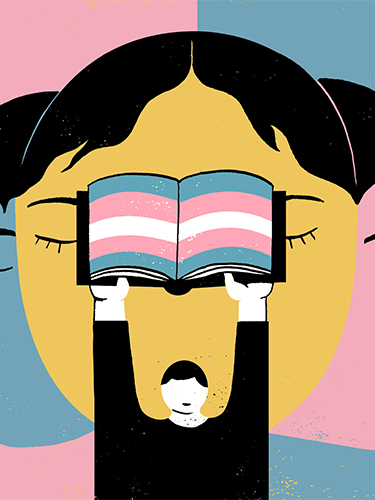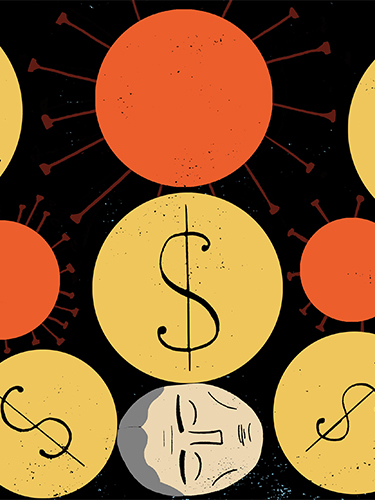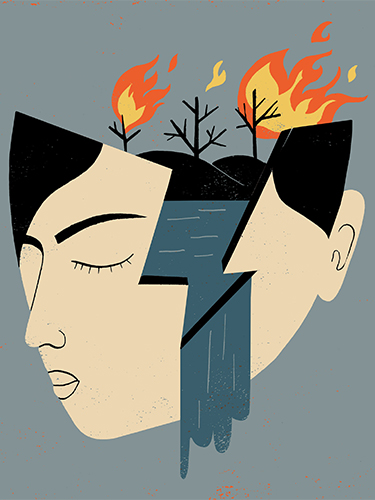Words in Action
Research & Inquiry
An ambitious new set of initiatives is teaching students the fundamentals of effective public writing. Their work is helping to shape critical cultural conversations.

Published January 7, 2022
When Violet Rawlings ’23 stepped onto the set of Showtime’s Dexter: New Blood in March 2021, she was there as a full-time working member of the film crew, not as a student. She had taken a semester off from her Smith studies to work on the show’s reboot in nearby Shelburne Falls, Massachusetts.
Rawlings plans to pursue a career in the entertainment industry. Working on the Dexter set revealed some hard truths about the profession. “It was eye-opening; it is a male-dominated industry, fraught with blatant sexism,” she says. The experience lit a fire for both the writer and the activist within her.
Now back at Smith pursuing a double major in film and media studies (with an emphasis on television) and the study of women and gender, Rawlings is looking toward her future through fresh eyes. She still has every intention of “forcing myself into the room” to dismantle the male-dominated thinking and attitudes that permeate the entertainment industry, but she is coming equipped with a new tool in her toolkit for change—the power of her own voice as a public writer.
“Whatever I end up doing, I think it will involve writing with a gender studies lens,” she says.
That Rawlings feels confident about sharing her experiences and ideas with a wider audience beyond just classmates, friends, and professors can be credited to an ambitious new set of initiatives known collectively at Smith as the Writing and Public Discourse (WPD) program. Launched in 2019, WPD is an enhancement to Smith’s already writing-intensive curriculum. At a time when an Instagram caption can go viral in minutes, an expertly crafted tweet can start a movement, and a compellingly written podcast can both entertain and educate, it is critical for students to understand the power and reach of their words. Through a range of opportunities, classes, and workshops, the Writing and Public Discourse initiative seeks to transform how students learn to write in their disciplines and train them to effectively translate their ideas into powerful written pieces that contribute to broader cultural conversations. So far, hundreds of Smith students have improved their public-facing writing skills, publishing personal essays, op-eds, and other writing on a range of topics in publications like Ms. magazine, the Daily Hampshire Gazette, and Medium.
“With this kind of writing, I’m honing my voice,” Rawlings says. “At Smith, you have to learn the rules of writing before you can break them.”
Funded by three grants totaling almost $1.6 million over three years, the Writing and Public Discourse program is neither a single course nor a multifaceted curriculum grounded in one academic discipline. Rather, according to Hélène Visentin, associate dean of the faculty, dean for academic development, and professor of French studies, the program touches nearly every aspect of academic life at Smith. Specifically, initiatives include over 50 new or significantly revised courses across all three academic divisions—the humanities, social sciences, and natural sciences—as well as a series of co-taught courses that foster collaboration among faculty.
“Through a rigorous approach to teaching writing, students across divisions learn how to test their ideas against standards of evidence, craft persuasive arguments, and translate disciplinary knowledge to a broad audience,” Visentin says.
As a result, students learn not only the basics of good writing but also how to be thoughtful citizens. “By offering students the opportunity to engage in public scholarship, they are given the gift of agency,” Visentin says.
Julio Alves, director of the Jacobson Center for Writing, Teaching and Learning and WPD committee co-chair, emphasizes that “in infusing public discourse in the writing curriculum, we are not abandoning our traditional academic mission. We see the two modes of writing as requiring different skill sets but also as very much entwined and mutually beneficial, though very often they are viewed as oppositional.”
The two modes of writing Alves is referring to are academic writing and journalistic writing. For too long, Alves says, people have had the oversimplified idea that mainstream writing doesn’t have the same intellectual heft as more scholarly work. “This is not true,” Alves says. “It is true that scholars are experts in their field and mostly dig deeply into a narrow topic, whereas journalists are mostly generalists who cover a wide array of issues over their careers. But it is also true that journalists often work closely with scholars and can become experts in their subject matter themselves; the sleight of hand in journalism that makes complex issues accessible to a wide audience hides how much work journalists actually do to get to that point.”
Both approaches to inquiry and communication are important. “They are productive and beneficial to the expansion of knowledge,” he says.
Suzanne Gottschang, professor of anthropology and East Asian studies, was tapped in 2019 to join the Writing and Public Discourse Committee, a nine-member advisory group of faculty charged with implementing grant-funded WPD initiatives. For her, the WPD program is particularly important because it helps students develop as writers and thinkers beyond traditional research papers or lab reports. “While these are important genres, our students also need to learn to write to engage with the communities they live in and grapple with the complex and urgent problems of our times,” she says. More than that, she notes, WPD is “designed to connect and demonstrate the public value of a liberal arts education.”
In many classes, faculty are encouraging students to drop the third-person analytical voice typically used in academic writing and instead present their scholarship in more personal ways. “Shifting the voice to the first person, as in blog writing, is new and different,” Gottschang says.
Other examples abound. Through the Calderwood Seminars in Public Writing, a collection of writing courses across a variety of disciplines, students engage in fast-paced assignments that teach them how to boil down complicated topics and big ideas into accessible prose. For example, this spring Gottschang will be teaching the Calderwood seminar Nature/Culture and Public Anthropology. She plans a series of assignments that encourage students to draw on their studies and personal interests to synthesize, expand, and reflect on the tense dichotomy between nature and culture.
In another seminar, Writing Philosophy for the Public Sphere, students composed essays about racism brought on by the pandemic, decriminalizing sex work as a human rights issue, and how to confront a sexist supervisor. One student even wrote a piece on creating a more inclusive landscape at Smith. For each assignment, students were asked to consider voice, audience, and evidence.
For his class Methods of Literary Study, English professor Richard Millington, who also serves as faculty director of the Writing and Public Discourse program and WPD committee co-chair, asked his students to write a series of personal reflections on poems by African American poets inspired by the life and music of jazz saxophonist John Coltrane and then post their work to a website. “The assignment generated quite an excitement about writing for an audience outside of the classroom,” Millington said.
In all, Smith has offered some 15 distinct Calderwood seminars in 13 programs or departments since the 2019–20 academic year, Millington says. Several of the seminars have been or will be offered a second time.
Other writing-intensive opportunities under the umbrella of WPD are being offered in programs outside the traditional classroom as well. The Wurtele Center for Leadership’s new Amplify initiative encourages students to experiment with different types of writing and media and, as center director Erin Park Cohn ’00 notes, make the most of their activist voices.
“Smith students are incredibly interested in applying what they’re learning in ways that can make change in the world,” Cohn says. The center’s Amplify Competition invites students to submit a piece to one of three categories—public art, public speaking, or public writing. Cash prizes are awarded, and all submissions are published on an Amplify website accessible to members of the Smith community.
Reflecting on their own work, Smith students have observed how these types of writing assignments have not only strengthened their writing and editing skills but have also given them newfound confidence in their ability to articulate why their thoughts and ideas are important to convey.
“My writing has become much more fluid and artistic,” wrote one student after evaluating a Calderwood seminar taught by Millington. “I trust my own voice now, which is something I have struggled with in the past.”
“When you are writing for a school assignment, you are imagining your audience is an audience of one—the professor,” noted Ari Jewell ’22, who wrote a piece for Ms. magazine examining both the gender nonconformity of hip-hop megastar Lil Nas X and the anti-trans bills that were part of 2021 state legislative sessions around the country. As Jewell composed the piece, they realized that their writing would have to reach people “who didn’t have an access point” to all the information about the issues of trans rights and transphobic legislation, unlike a college senior who is majoring in the study of women and gender. “I wanted to reach other people and give them the information they needed to know. That included casual readers of the magazine, as well as my parents and my grandparents,” Jewell said.
Whether writing is considered an art or a skill, most students and faculty involved with the public writing initiatives agree that it is important to know how to package scholarship into a communication that the broader public will have an appetite for. And given today’s divisive culture, it is even more important to be able to express ideas in a way that elevates the public conversation and makes room for an array of voices. Professor Visentin points to Smith’s Year on Democracies as a perfect example of putting the lessons from the Writing and Public Discourse program into action. “The Year on Democracies and Writing and Public Discourse share the same DNA, ingraining the virtues of courage, community, and integrity—hallmarks of a robust democracy,” she says. “Through the WPD program, we aspire to shape today’s activists, informed citizens, and tomorrow’s leaders—indispensable players on the stage of any democracy.”
Jan McCoy Ebbets is a senior editor in Smith’s Office of College Relations.
Student Writing Sampler
From op-eds on trans rights to essays on climate change, students are using their words to push for change.
Illustrations by Hanna Barczyk.
 Ari Jewell ’22
Ari Jewell ’22
Lil Nas X, Gender Nonconformity and the Fight Against Transphobic Legislation
Excerpted from Ms., April 15, 2021
The new year ushered in an onslaught of dehumanizing anti-trans state legislation. Throughout the country, over half of all states will vote on transphobic bills in the 2021 legislative session. Last week, the Arkansas legislature became the first state to ban gender confirming health care for trans youth after it overrode Governor Asa Hutchinson’s veto of the law. And dozens of states are currently considering bills which would prohibit trans youth from playing sports on a team that matches their gender. Three states—Arkansas, Tennessee and Mississippi—have already passed this legislation. Despite the widespread and vehement transphobia this legislation reveals, polls show most Americans are increasingly supportive of transgender rights. And the positive reception of celebrities like Elliot Page, Harry Styles and Hunter Schafer has demonstrated that transness and gender nonconformity are more than just accepted—they’re celebrated, especially by the young people who shape pop culture. Recently, the American public once again proved its celebration of gender nonconformity. Lil Nas X, the gay rapper who found fame in 2019 with his single “Old Town Road,” released a gender-bending music video on March 26 which has already garnered well over 100 million views.
 Violet Rawlings ’23
Violet Rawlings ’23
Secret Emails Expose Anti-Abortion Groups’ Influence on Public Health Official
Excerpted from Ms., June 18, 2020
Earlier this month, the Campaign for Accountability—a nonpartisan and nonprofit watchdog organization focused on the ethical misconduct and wrongdoing of public officials—released communications from Dr. Diane Foley, current deputy assistant secretary for population affairs at the U.S. Department of Health and Human Services (HHS). The documents contain correspondence between Foley and anti-abortion organizations—including Focus on the Family, Live Action, Family Research Council and the Heritage Foundation—about the promotion of “natural family planning methods” over hormonal and barrier birth control. Feminists first raised red flags on Foley back in 2018 when Donald Trump first appointed the former president and CEO of anti-abortion organization Life Network to direct government funding for reproductive health. … The emails, obtained through FOIA litigation, reveal that since obtaining her leadership position at HHS, Foley has maintained communication with anti-abortion groups, awarded funding for fake crisis pregnancy clinics (instead of actual reproductive health care providers), and undermined the availability of affordable birth control. Her emails expose a clear violation and misuse of Title X. In fact, Foley wants to decrease Title X funding for contraception methods such as condoms, IUDs and hormonal birth control pills—opting instead for fertility awareness-based methods (FABMs). … Most importantly, even if practiced with typical use, FAMBs are incredibly ineffective—according to the CDC, for every 100 women using this method, 24 women will have an unintended pregnancy.
 Veronica Uribe-Kessler AC
Veronica Uribe-Kessler AC
Colombia’s Struggle Against Poverty
Excerpted from Reuters, May 11, 2021
The Covid-19 pandemic has caused the greatest economic recession in Colombia in at least a generation. While inequality of wealth is the highest among members of the Organisation for Economic Co-operation and Development, the United Nations also reported that the poverty rate in Colombia is now the highest in South America. The Economic Commission for Latin America and the Caribbean reported that 37.5% of Colombians lived below the poverty line at the end of 2020. Poverty increased significantly while the country’s three richest men owned more than 10% of the country’s GDP. With some 51 million people, between 18.9 million and 23.9 million Colombians lived on less than $91 a month in 2020. Of these, 15 million missed one meal a day and the remaining were near starvation. The Colombian government should reform the tax system and tax the rich more heavily. In 2018, while the richest 20% of the population received 55% of the country’s income, 80% of the population scrambled over the remainder. The earnings of the richest 20% contribute little to the economy, experts say, because they find tax havens overseas, or invest in stocks abroad, none of which stimulates the domestic economy
 Asli Ali ’22
Asli Ali ’22
With Our Climate in Crisis, Preparing for an Uncertain Future is Daunting
Excerpted from MassLive, September 17, 2021
I love my family, but the mere thought of bearing my own children racks me with guilt. To offer some perspective, I have a great fear for the youngest person I know and closest to me—my seven-year-old brother. He doesn’t know that the year he graduates from high school, in 2032, the world will see the heightened repercussions of our abuse. He cannot fathom that the news will be filled with compounded natural disasters, the economic, environmental, and mortality effects of which will result in numbers he cannot currently comprehend. But I know. And I am terrified. This is not the life anyone wishes for a loved one. Floods, hurricanes, droughts and other natural disasters have been around forever and now there is scientifically led proof they are worsening due to human-inflicted climate change. Day after day, the structure of Pandora’s box is being tested; finding a way into its lock are keys forged from the aftermath of our wasteful lifestyle. Who would want to open it? Those without foresight or imagination. Those who won’t live to see the day of inconceivable damage.
This story appears in the Winter 2022 issue of the Smith Alumnae Quarterly.
Grants Give Voice to Would-Be Writers
The Writing and Public Discourse program is transforming how the college is teaching students to articulate their ideas and knowledge through their writing. Three major grants provided the financial support for the key initiatives that are the backbone of the program, which launched in 2019.
The Writing in Service of Public Discourse initiative, with $900,000 from The Andrew W. Mellon Foundation, provides five host academic departments with five visiting assistant professors to collaborate and co-teach with faculty as well as to revise core courses and integrate more public discourse writing opportunities.
The Calderwood Charitable Foundation provided $445,000 in support of the Calderwood Seminars in Public Writing, a series of capstone seminars centered on such writing assignments as book reviews, op-eds, and podcasts. The student writing is intended for a nonacademic, public audience and structured around pre-publication peer review within the classroom.
The Writing-Enriched Curriculum initiative, with $250,000 from The Davis Education Foundation, supports writing curriculum innovation and engages academic departments in an ongoing faculty-driven process focused on creating, implementing, and assessing undergraduate writing plans aligned with Smith’s writing and public discourse goals. The program is led by the Jacobson Center for Writing, Teaching and Learning.—JME
“At Smith, you have to learn the rules of writing before you can break them,” says Violet Rawlings ’23, a participant in the college’s Writing and Public Discourse program.